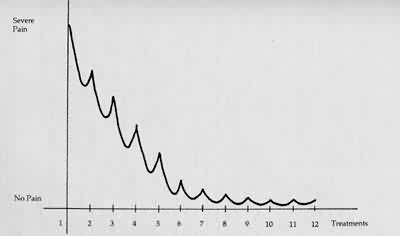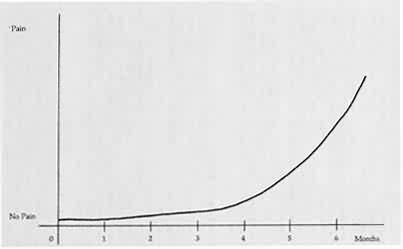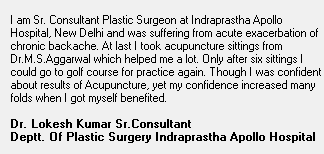|
What
is Acupuncture?
China
is one of the oldest countries on this planet. During the
last 5000 years, the main and only medicine of Chinese people
was Traditional Chinese Medicine, which now is known as
acupuncture and herbal medicine in Western Countries.
In fact, acupuncture and Chinese herbal medicine are only
two main techniques of Chinese traditional medicine, which
also includes other treatment methods as Qigong, Taiji and
Chinese Massage.
What
is the difference of Chinese traditional medicine and Western
medicine?
Well,
this question is very complicated. Basically, the outline
of Chinese traditional medicine is very different from conventional
Western medicine. In the treatment of a patient, Chinese
traditional medicine will use some techniques as acupuncture,
herbs, cupping, massage and maybe even bleeding.
These techniques are so different from conventional Western
medicine that many scientists or Medical doctors do not
think it to be science.
But if you take a insight of Chinese traditional medicine,
you will find Chinese traditional medicine is a logical
and reasonable science with real scientific spirits, just
like Western medicine.
Some medical scientists think the difference of Chinese
traditional medicine and western medicine is that Chinese
traditional medicine is based on an obscure theory, especially
based on the ancient pure philosophy and long practice experience,
but the western medicine is based on clear calculation as
modern anatomy, physiology, pharmacology and so on.
How
can these ancient medical methods cure some serious diseases?
In Asia
like China, Japan and Korea, this is not a question. Because
Asians have used Chinese traditional medicine as the unique
medicine during the past thousands of years, so in their
minds, there is no doubt at all if Chinese traditional medicine
can cure diseases or not.
But for most Western people, it is not easy to make them
believe that Chinese traditional medicine is a real science
since it is so different from their past experience.
In fact, just like other sciences, Chinese traditional medicine
is also a science, although it is very old. Along with the
modern research on Chinese traditional medicine, there are
more and more western people begin to learn it, accept it
and believe it is an effective medical science.
To some serious diseases, such as neurological disorders,
auto immune disorders etc., the treatment of conventional
western medicine is very limited or with a lot of side effects.
These limitations compel many patients to try Chinese traditional
medicine. After these patients used acupuncture, herbal
medicine or other Chinese medical methods, they found Chinese
traditional medicine really worked.
After all, Chinese traditional medicine is one kind of the
most ancient and time tested medicines.
What
is the reason that acupuncture can work?
The
Chinese state that if acupuncture is to achieve its maximum
effect it is necessary for the acupuncturist to obtain a
'needling sensation', over each acupuncture point that is
used. This involves the needle being moved slightly while
it is in the skin, and the sensation experienced by the
patient will vary. Needling sensation is not painful but
a dull, bursting or numb sensation around the site of the
inserted needle. The sensation may also travel up or down
the channel being treated; the stimulation of an acupuncture
point on the right knee may precipitate the experience of
a strange burning or numb sensation in the right ankle.
Needling sensation is probably best defined by the statement,
'When needling sensation is experienced the needle no longer
feels like a needle!'
Some
acupuncturists use an electrical stimulator to excite acupuncture
points as a substitute for obtaining needling sensation.
Electro-acupuncture causes a tingling sensation over the
acupuncture points that are being stimulated, but the Chinese
believe that this does not replace the need to obtain needling
sensation. If the stimulator is mistakenly turned to a very
high intensity then the patient will experience some discomfort,
so it is wise to be cautious when using electrical stimulators,
and to adjust the intensity slowly and carefully
Another
common misconception is that patients must 'believe' in
acupuncture to enable it to work. This is similar to the
idea that acupuncture is a complex form of suggestibility,
but this is quite wrong. Like any other type of medicine
acupuncture works on those who believe in it and those who
do not. The mechanism of acupuncture is not clearly understood
but, as has already been mentioned, it is quite clear that
reproducible biological changes occur when an acupuncture
needle penetrates the skin. Whilst accepting that all medical
treatment is more effective if the doctor is trusted by
the patient, this trust is not a prerequisite for the physiological
changes that occur during and after acupuncture.
Patient's Response to Acupuncture treatment
It is
very difficult to be dogmatic about how a patient will respond
to acupuncture. Occasionally, one treatment is all that
is required, whilst other people may need a number of treatments
to gain the same result for the same disease. In general
most people, and their problems, do not respond magically
to one treatment, and between four and eight treatment sessions
may be required in order to obtain the best results from
acupuncture.
Acupuncture
usually works in stages. The first two or three treatments
represent a process of 'understanding the needs of the patient',
and are therefore a sort of experiment designed to assess
the specific requirements for that person in that particular
condition. Some people respond to classical Chinese body
acupuncture, whilst others respond better to ear acupuncture.
This partially reflects the skill of the acupuncturist in
the use specific techniques, but it also represents the
fact that the body responds in a slightly different way
to slightly different stimuli. Some people seem to respond
to a particular acupuncture technique for one condition,
whilst requiring a completely different technique for another
complaint. A patient may even respond to a particular approach
for a specific condition and then stop improving half way
through treatment, thus necessitating an alternative approach
to that condition.
 

If a
patient experiences some symptomatic improvement at the
first consultation, then they often gain considerable relief
from a course of acupuncture; equally, many people who do
not obtain symptomatic improvement at the first consultation
may also gain a great deal from acupuncture. It is a good
prognostic sign if there is some instant improvement, although
the improvement gained at the first consultation rarely
lasts longer than 1-2 days, and may last only a hrs. Subsequent
treatment should then give a better and more prolonged result
and, as shown on the graph, the symptoms should gradually
disappear as the treatment becomes effective.
Ten
sittings should be adequate to foretell whether a patient
will respond to acupuncture adequately or not. If there
has been no response to treatment after the first ten sessions
then it is doubtful whether any response will occur. This
should be taken as a general guideline and not as a rule
as sometimes the symptoms of a particular condition may
be very fluctuating, and it may be difficult to obtain a
clear assessment of the results of treatment. Occasionally
the patient may not find it easy to remember exactly what
the condition was like three weeks before and this too can
create difficulties, so it is wise to keep a diary and assess
day by day the changes that are arising in the problem being
treated. This will allow the patient and the acupuncturist
to develop a clear idea of the response to treatment, and
to assess whether the treatment is worthwhile.
Most
acupuncturists continue to treat a patient until there is
no further improvement in their condition. The response,
as shown by the graph, tends to 'level off' towards the
end of treatment (usually after five or six treatments)
and this 'leveling off' signifies that further treatment
will probably not give further benefit. Acupuncturists in
the West tend to treat people on a weekly basis; in China
treatment is given daily, but this seems to be more from
habit rather than for any good medical reason. Weekly treatments
allow both patient and acupuncturist to gain a clear assessment
of the progress and response to treatment.
Some
reactions to Acupuncture you should know
Sometimes
a patient may experience a temporary worsening of symptoms
due to acupuncture; this is a response to treatment and
is a good sign. Such 'reactions' to treatment only last
for a short time, perhaps a day or two, and are usually
followed by improvement. A 'reaction usually means that
the acupuncture needles have been over stimulated as some
patients are very sensitive to acupuncture and may respond
to normal stimulation by overreacting. If a 'reaction' occurs,
the patient should be stimulated less at the next treatment
session, this means giving a shorter and less aggressive
treatment. Sometimes the improvement may be very delayed
and the condition may not improve until the treatment has
ceased. Occasionally patients who have been abandoned, with
no improvement after three weeks, will suddenly find improvement
some weeks after the acupuncture has ceased.
Cure
or Symptom Relief?
Acupuncture
can be a cure, or it can act as a palliative treatment;
this depends on the condition that is being treated. If
a chronically painful arthritic knee is treated with acupuncture
then, on average, the improvement will last about six months
and the knee will then require re-treatment. Some acupuncturists
treat their patients every three months or so to avoid any
deterioration in their condition. The traditional Chinese
approach is to attempt to maintain the patient in a state
of health and a regular three-monthly treatment pattern
is therefore justified; however, many acupuncturists just
treat patients when the symptoms recur. If the condition
is self-limiting, such as the pain from an attack of shingles,
then no further treatment is required after the pain is
relieved.
Whole
Body Therapy
In the
West the vast majority of people look upon acupuncture as
an alternative treatment for pain; therefore pain is the
most frequently presented complaint at an acupuncture clinic.
If the patient is approached from the traditional Chinese
viewpoint then the body is treated as an integrated system.
People in pain frequently have other complaints, such as
heartburn or depression, and if the body is treated as a
complete system then these complaints will also be treated,
and often resolve during the course of acupuncture. The
patient may be quite surprised to find that some other problem
has suddenly improved, as it was not realized it was amenable
to acupuncture treatment and therefore not mentioned to
their acupuncturist
|






